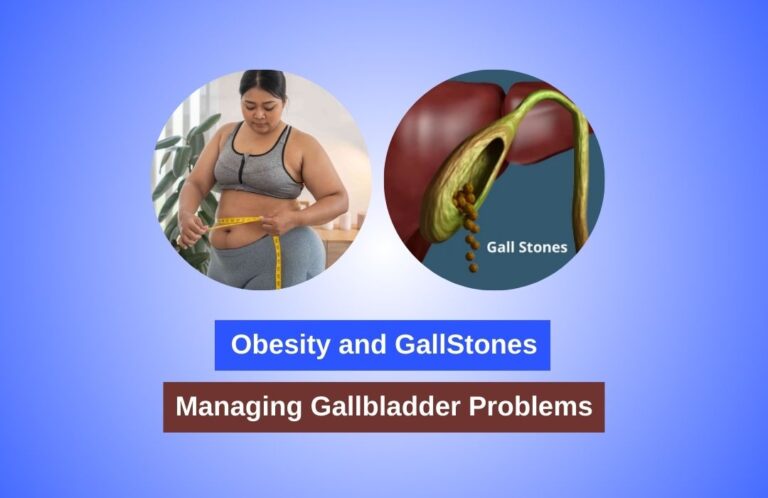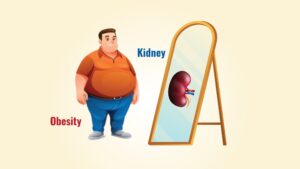
Vidhi Dave
Bariatric Dietician & Content Writer
Carbohydrates and Its Role in Obesity

Gall bladder is an unsung hero of the human body, working tirelessly in the background to promote digestion but rarely receiving any recognition for its efforts. When obesity is a factor, however, this organ that often goes unnoticed can become a source of discomfort, distress, and issues that make life difficult. We have arrived at an important turning point in the fight against obesity: the connection between being obese and developing gallstones.
Obesity, a global health problem that has reached epidemic proportions, not only impacts the way that we look and feel, but it also affects the way that our bodies function. Gallstones are one of the many consequences of gallstone disease, and despite their frequency, they are frequently overlooked as a potential concern. These tiny, pebble-like aggregates in the gallbladder can pack a powerful punch, producing severe discomfort and possibly having life-changing repercussions for the patient.
What are Gallstones ?
The gallbladder is a tiny organ that looks like a pouch and is located just under the liver. The primary function of this organ is to collect and concentrate bile.
Bile is a fluid that is created by the liver in order to aid in the digestion of lipids. After traveling through a network of passageways known as bile ducts, it arrives in the gallbladder.
The gallbladder is responsible for storing bile, which, as it accumulates, gets more concentrated and more efficient in digesting fats. When it is required, the gallbladder will empty its contents of bile into the digestive tract.
Gallstones can be as small as a single grain of sand or as large as a golf ball in size. It’s possible that you won’t realize you have them until they cause pain by blocking a bile duct, at which point you’ll need treatment as soon as possible.
What Causes Gallstones ?
Waste products such as cholesterol and bilirubin, which are produced by your body as a byproduct of the breakdown of red blood cells, are carried by bile. These things have the potential to cause gallstones.
So if your liver excretes more cholesterol than your bile can break down, the extra cholesterol may crystallize and eventually form stones.
Also certain illnesses, such as liver cirrhosis, biliary tract infections, and certain blood disorders, cause your liver to produce an excessive amount of bilirubin. Excess bilirubin promotes gallstone development.
Link between Obesity and Gallstones
One of the most major risk factors that might lead to the development of gallstones is obesity. Gallstones are more likely to develop in people who are overweight or obese, according to study findings, as compared to people who have a healthy body weight. This is because having an excessive amount of body fat might cause an increase in the levels of cholesterol found in the bile.
In addition, obesity can decrease the flow of bile into the small intestine by affecting the muscle contractions of the gallbladder and causing it to become less active. This can lead to the bile being weak, which in turn increases the chance of gallstones developing. Individuals who are overweight or obese and also have other health concerns, such as diabetes or high cholesterol, are at an increased risk of having gallstones. This risk can be further increased if the individual is also a smoker.
Studies have shown that fad diets and losing weight too quickly can both lead to the development of gallstones. Although lowering weight is one strategy to reduce the chance of developing gallstones, this does not mean that it is the only approach.
Importance of losing Weight safely to Reduce the Risk
If you want to minimize your chance of having gallstones and are overweight or obese, the best way to do it is to lose weight in a healthy way. This could involve making adjustments to your diet, such as increasing the amount of fiber that you consume. In addition, lowering your consumption of processed foods and foods that are heavy in fat and increasing the amount of regular physical activity you get.
Individuals who are morbidly obese may also consider bariatric surgery as an alternative in certain circumstances. Especially those who have trouble keeping their weight under control by only making modifications to their lifestyle.
Bariatric surgery is the only line of treatment for someone whose BMI (Body Mass Index) is more than 30, as diet or exercise are not effective for them in achieving weight loss. Bariatric surgery will not only help you lose weight but also may help to reduce the risk of developing new stones in future.
Aastha Bariatrics Centre of Excellence for Bariatric and Metabolic Surgery. At Aastha Bariatric, we provide our patients with comprehensive information about bariatric surgery, including its risks, benefits, the recovery process, and what they can expect post-surgery. Our commitment is to be compassionate, patient, available, informative, and supportive advocates for our patients throughout their bariatric surgery experience.







